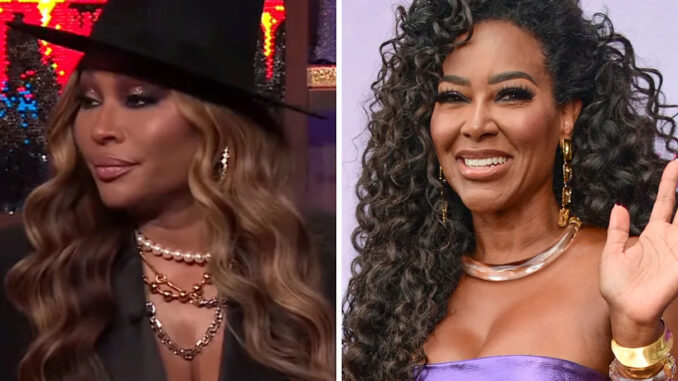
The quiet hum of the air conditioning was the loudest sound in Cynthia Bailey’s Atlanta home, a stark contrast to the usual vibrant symphony of laughter, gossip, and the ever-present buzz of a Bravo production crew. Sunlight, filtered through sheer curtains, painted pale stripes across the polished floorboards, illuminating dust motes dancing in the stillness. It was in this serene, almost sacred, silence that the news landed, not with a bang, but with the insidious creep of a viral headline across her phone screen: “Bravo Cuts Ties with Kenya Moore.”
Cynthia’s meticulously manicured hand, usually so steady, trembled slightly as she lowered the phone. A gasp, more a sudden intake of breath than an audible sound, escaped her lips. Her eyes, wide and disbelieving, fixed on the innocuous text, as if willing it to morph, to dissolve into a prank or a misprint. But the words remained, stark and unyielding. This wasn't just a headline; it was a visceral punch to the gut, a betrayal of the invisible tether that had bound her, and so many others, to the unpredictable, high-stakes world of reality television.
Shock. It registered first as a physical jolt. Her shoulders hunched almost imperceptibly, as if bracing against an unseen blow. The carefully constructed composure she’d honed over years in front of the camera, years navigating the treacherous currents of the Housewives universe, threatened to crack. Kenya. Kenya Moore. The woman whose name was synonymous with dramatic entrances, iconic catchphrases, and an unyielding will. The woman who, despite their very public squabbles and the infamous "friendship contract," had become an undeniable cornerstone of the show, and more importantly, a true friend.
The shock rippled outwards, a dizzying wave of disbelief. How could Bravo just… cut ties? Kenya wasn't just a cast member; she was a phenomenon. She had delivered countless viral moments, stirred the pot with a theatrical flair unmatched by many, and then, in moments of raw vulnerability, peeled back layers to reveal a single mother fiercely devoted to her daughter, Brooklyn. Cynthia knew the rules of the game were brutal, the unwritten laws of "what you give is what you get" often ending in an unceremonious exit. But this felt different. This felt like dismantling a fundamental piece of the show’s very architecture. It was a stark, cold reminder of the business behind the "sisterhood," the corporate hand that could, with a single stroke, erase years of shared history.
Then, as the initial jolt subsided, the sadness crept in, a heavy, suffocating blanket that settled deep in her chest. It wasn’t just a fleeting pang of sympathy; it was a profound empathy for a friend who, despite her sometimes impenetrable facade, was deeply human. Cynthia envisioned Kenya receiving the news, perhaps in a hushed phone call, the weight of a decision made in a boardroom far away crushing down on her. She knew the pride Kenya carried, the way she had carved out an identity for herself and her family on that very platform. To have it summarily taken away, to be deemed no longer "relevant" or "valuable" by the very machine that had elevated her, was a public humiliation, a professional and personal severance that would undoubtedly sting to her core.
A sigh escaped her lips, a sound heavy with the weight of shared memories. She remembered the early days with Kenya, the cautious dance of two strong personalities learning to coexist, then to respect, and eventually, to genuinely care for one another. She remembered the laughter over cocktails, the late-night phone calls dissecting drama, the quiet moments of support when the cameras were off. She remembered Kenya’s journey to motherhood, a dream so long deferred, finally realized on the very show that now cast her aside. This wasn't just about a job lost; it was about an identity fractured, a platform silenced, and the abrupt end to a chapter that had defined so much of Kenya’s recent life.
The sadness was also for herself, in a way. Not a selfish sadness, but a melancholy recognition of the ephemeral nature of their world. So many friendships had been forged and tested under the relentless glare of the cameras, an unnatural crucible that somehow melted strangers into a peculiar, often dysfunctional, family. Kenya's departure felt like the severing of an invisible cord connecting them all, a stark reminder that no one was truly safe, that the next "cut" could be anyone's. It was the end of an era, not just for Kenya, but for the collective consciousness of the RHOA sisterhood as they knew it.
Cynthia closed her eyes, picturing Kenya's vibrant smile, her dramatic hair flips, her fiercely protective spirit. A silent promise formed in her mind: the cameras might be gone, the Bravo checks might cease, but the bond forged in the chaotic crucible of reality television, the genuine connection that had somehow survived the manufactured drama, that would endure. Because beyond the shock of the news, beyond the profound sadness for her friend, Cynthia knew that true friendship, unlike a TV contract, wasn’t subject to cancellation. It simply was. And for Kenya, in this moment of devastating loss, that quiet, unwavering support from a friend like Cynthia would, she hoped, be a balm for the brokenness.